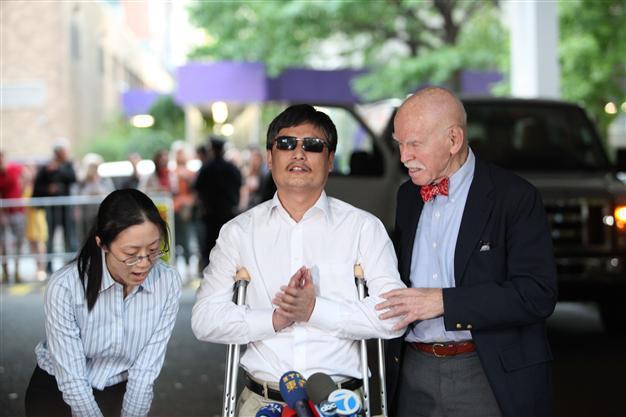Blind Chinese dissident begins life in US
NEW YORK - Agence France-Presse

Chinese activist Chen Guangcheng makes remarks to the media, while standing beside NYU professor Jemore Cohen, upon arriving on the campus of New York University on May 19, 2012 in New York City. AFP photo
Blind Chinese activist Chen Guangcheng was to spend his first full day in the United States Sunday after praising Beijing's "restraint and calm" as he sought to draw a line under a month-long tussle that tested China-US ties.Chen asked to say a "few simple words" as he, his wife Yuan Weijing, and their two young children were greeted with cheers on arrival at the New York University apartment block in Manhattan Saturday that now becomes their home.
He expressed gratitude to the American embassy for ushering him to a new, free life in the United States but added: "I am gratified the Chinese government dealt with the situation with restraint and calm." Speaking through an interpreter, Chen said he believed the Chinese government's promises were "sincere," although friends of the dissident said he was clearly very worried about the fate of relatives left behind.
One of China's best-known activists, Chen, a self-taught lawyer, won plaudits for investigating forced sterilizations and late-term abortions under China's "one-child" family planning policy.
He and his family touched down at Newark-Liberty International Airport, outside New York, on a United Airlines flight from Beijing late Saturday.
Chen made a dramatic escape from his village in April after seven years spent mostly in prison or under house arrest, eventually securing sanctuary at the US embassy in Beijing.
In a gripping account of his escape, Chen told AFP earlier this month that after weeks of preparation to put his guards off the scent, his wife pushed him over a wall built around his small home.
He broke his foot when he landed on the other side, but undeterred, he scrambled in pain to a neighbor's pigsty, where he hid until nightfall.
After a long and painful journey through fields and over walls, he eventually made his way to the home of a friend.
Chen, who had been held under house arrest since being released from a four-year jail term in September 2010, said he had suffered repeated beatings and expressed serious concerns for his wife and family.
He pitched up at the US embassy in Beijing less than a week before US Secretary of State Hillary Clinton was due to visit China for high-level talks.
Chinese and American diplomats scrambled to find a solution, and reached an initial agreement under which Chen would stay in China under more agreeable conditions.
Chen left the embassy but regretted it almost immediately, telling journalists that he wanted to go to the United States. China later relented, saying he could apply to go abroad like any other Chinese citizen.
After being holed up for more than two weeks at a Beijing hospital with his fate still uncertain, Chen was suddenly given notice earlier Saturday to pack up his belongings and prepare for departure.
Jiang Tianyong, a lawyer and close friend, said Chen had mixed feelings about leaving China.
"He seemed to be reluctant to leave and didn't consider it the optimal solution, even though he agreed that it was the best he could do to ensure his personal safety," Jiang said.
US politicians welcomed Chen's arrival but many also expressed concern about his family and other dissidents who remain in China fearing repression.
"We remain deeply concerned, however, that Mr. Chen's supporters and family members who remain in China face the real threat of retaliation from Chinese officials," read a statement from the Congressional Executive Commission on China, set up in 2001 to monitor human rights there.
"The Chinese government must guarantee their safety and well-being, and ensure that their fundamental rights to free expression, liberty of movement, and access to counsel are fully protected." Former House speaker Nancy Pelosi hailed Chen's arrival in the United States as "a milestone in the cause for human rights in China." "The courage of Chen Guangcheng to risk his life and livelihood to advocate for disadvantaged people in China is an inspiration to freedom-seeking people around the world," she said.
"I am happy that Mr. Chen is now able to safely study in the US, and he and his family can now pursue their goals." Li Jinsong, a friend and lawyer, said Chen's impact may lessen after the self-taught "barefoot lawyer," famed for his grassroots work, reaches the US.
"But he and his family have been through much hardship over the past seven and eight years, and I'm happy that they can go abroad and enjoy a bit of safety and freedom," he said.
Chen has repeatedly said he is not seeking exile in the United States and may one day want to go back to China.
But past cases suggest the Chinese government will be reluctant to allow the return of a man whose escape caused international embarrassment.
"If he wants to come back to China, I think it will be very difficult," retired Shandong University professor Sun Wenguang told AFP. "The authorities will not welcome him back."
















